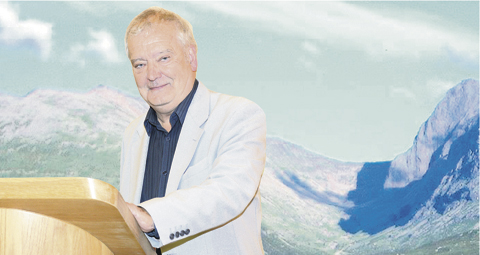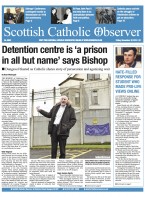BY Ian Dunn | June 20 | ![]() 0 COMMENTS
0 COMMENTS ![]() print
print

Historian has scaled academic heights
Professor Tom Devine is fond of referring to history as the ‘queen of disciplines,’ but as the award of a Knighthood last weekend underlined, as far as Scottish history goes, he is the king. His research lauded, his books bestselling—he is widely accepted as the foremost expert on modern Scottish history. As he prepares to depart the field of academia, he remains in pugnacious form and spoke to the SCO recently about the impact of the Irish on Scotland, independence, the secularist threat to Catholic schools and why he would have been a terrible secondary school teacher
On Monday, the great and the good gathered in Edinburgh University in a rare display of public affection for a historian. Professor Tom Devine will shortly retire from his position at the university and, although he intends to continue to write and give public lectures, this marked the end of a long and fruitful association with academia. It is testament to his remarkable success that he was joined on stage by a former Prime Minister—Gordon Brown—who set aside political rivalries to pass on fulsome tributes from the current Prime Minister and First Minister.
Yet, as a young man, the idea he might become Scotland’s pre-eminent historian would not have occurred to Professor Devine.
“I was not in any sense an academic at school,” he told the SCO. “I was more interested in social events and even gave up history at the end of second year because I found it so boring! It wasn’t until 18/19 that a competitive dynamic kicked in and I started to go in for some hard study, but even then I never thought I’d become a university teacher.”
His father and uncle were second-generation Irish immigrants, and among the first of such to graduate from Glasgow University in the 1930s and became teachers. He assumed he was travelling in the same direction.
“In the 1960s and 70s there was such a shortage of teachers that students like myself would go into schools and teach in May, June, August and September,” he recalled. “I taught French in a variety of schools, even my old school, Our Lady’s High School in Motherwell. Now these were the days of corporal punishment, and I remember going back on Friday and saying to my father ‘I’m going to get x on Monday morning, he’s driving me insane!’
“Now my father had a big reputation as a very fair person, he was known as ‘Wee Gerry’ because he was very small, but maintained great classroom discipline, simply through personal force. And he said: ‘Thomas, I don’t think you should go into school teaching, because you’ve got to be absolutely fair and pupils recognise justice instinctively.’ So that was me told. And, of course, in what some call ‘the snake pit of Scottish history’ it’s absolutely necessary to be combative and robust!”
Although the professor has become famous for his research work, surprisingly one minor niggle about his career is the fact that he didn’t take his career in an administrative direction.
“I did come to a cross roads in the mid-1990s. I was depute principle at Strathclyde University and I decided after four years as senior manger go back to scholarship,” he explained. “I really liked having a management role, but you can’t combine the two. After a few years the scholarship becomes stale. Unlike teaching, where in that job if you’re doing positive things you see the results at the end of the day, it’s very difficult to know your impact on an undergraduate audience and maybe they don’t know either.
So I don’t know if I made the right choice, but then who remembers a vice chancellor when he retires?”
Irish immigration
As the descendant of Irish immigrants, his work has often touched on patterns of emigration and immigration, but he is not afraid to challenge the conventional view.
“The scholars used to say you had the indigenous Scottish nation—a stable population—and then there was this mass arrival of mainly Catholic Irish had to be integrated or assimilated or kept at arms length,” he said. “But when the Irish were coming in, modern Scotland was already being shaped, It had urbanised, industrialised and gone through an agricultural revolution at a fast pace than any other European country, until forced soviet industrialisation in 1920s and 30s.
“So the Irish come in at that point and immediately contribute to mainstream Scottish society despite hostile attitudes in the early days and after that they were as significant in modernisation as native Scots. The mark of the Irish in Scotland remains physical, the ports, the railways, the bridges, the mines have mainly gone, but that infrastructure remains, so they had a central role into catapulting Scotland into a new era.”
He believes that situation may explain why ‘despite the labour market discrimination, and the hostile attitudes that continued until recent times the Irish in Scotland never experienced the outbreaks of brutal violence you got in Liverpool and America after the famine.’
“One way to see this, and this may not go down well, is to consider the relative patience of Scottish Presbyterian people,” he said. “Between 1846 and 1851 100,000 Irish came to Scotland and they were largely impoverished, ill-educated, vectors of typhus, yet, in my view, there was nothing like the hostility that greeted the few hundred asylum seekers that were put into Glasgow estates a few years ago. So this is not entirely a story of hostile Scotland and victim Ireland.”
He finds this particularly remarkable given that ‘Protestantism in 16th to 18th centuries hated ‘‘Popery,’’ Charles Edward Stewart was known as limb of Satan, and Satan was the Pope!’
Secularism
He sees such sectarian divisions as largely of the past, dismissing the Orange Order as ‘pathetic’ and instead sees the main enemy of the Catholic Church as ‘the potentially powerful forces of aggressive secularism.’
“What I don’t understand is why people, who come from a liberal background, can’t live and let live,” he said. “You have this new dynamic that’s appeared out of nowhere and when you hear some of them speak the level of ingrained hatred is quite remarkable.”
Despite the present broad, political support for Catholic education in Scotland, Professor Devine fears that it may come under increasing pressure from secular antagonists.
“I was at an event recently and a priest was speaking about the well-known evidence of disproportionate results of Catholic secondary schools sector especially regarding children from disadvantaged backgrounds, which is well documented in the social literature,” he said. “But he then pointed out just how vulnerable the Church is in terms of its schools, not from assault, but from within. One of the main premises of Catholic schools is the moral fashioning of those young people in the terms of that Faith tradition and as he pointed out, how many of them go to Mass on a Sunday?”
“For me that’s the unexploded bomb, that ironically the forces of opposition have not yet detonated,” he said. “And that came from a cleric, though, of course, he sees it from the pulpit every week. I went back home to talk about this with my wife, who is a very committed Catholic, was president of Legion of Mary and she said the schools are obviously a factor but the main thing is the family.”
He points out that you had this ‘generation that haemorrhaged away from the Church in the 1960s, 70s and 80s, that may be the elephant in the room, because what more could the schools do?’
Although Catholic Mass attendance has declined in recent years, surprisingly self-identification as Catholic has held steady. Unlike in the Church of Scotland, which declined by more than 400,000 between the 2001 and 2011 census.
“Well Catholic immigration is significant here, with 100,000 Poles coming to the country, but also given it’s self-awareness as minority religion, what is built in is social loyalty, which Protestantism doesn’t have,” he said. “There’s no such thing as cultural Presbyterian, but there is such a thing as a cultural Catholic.”
Nationalism
He is also open to the idea that a side effect of the rampant decline of the Church of Scotland has opened the door to the rise of political nationalism in Scotland.
“The most recent analysis suggests that Catholics are the most pro-independence, followed by non-believers, with the Church of Scotland members trailing behind,” he said. “One of the glues of the union was Protestantism and I think the erosion of so many of the authority institutions from 1960s—region, marriage, lifestyle—didn’t inevitably lead to nationalism but it did create the preconditions for allowing new ways of thinking to emerge.”
In the 1970s, he recalled, ‘many Catholics feared it would be a Kirk ridden Scotland with devolution, but now only 16 per cent of Catholics had any fear of independence.’
“Of course Catholics have been caressed by SNP Government, who have stolen the clothes of their traditional political home, the Labour Party and made sure to be spirited defenders of Catholic education despite driving through some overtly secular policies,” he said.
Though these developments may seem obvious in hindsight, he does say that one of the reasons he repeatedly asserts ‘the future is not my period’ is because of changing fortunes of Scottish nationalism.
“In 1950s the SNP a was a sect, not a party, and it constantly lost deposits,” he said. “The Tories won the biggest landslide of any party ever in Scotland in 1955 and, in 1950, the Scottish Labour Party gave up its commitment to home rule, so there was no sign of the extraordinary thing that would happen from the late 20th century into the present day.”
He is in no doubt, as to just how extraordinary an occurrence the independence referendum is.
“It’s epical event,” he said. “Whatever happens, Britain will never be the same again, because even if it’s a No, there’ll be devolution maximus sooner rather than later. When I lecture abroad, they cannot grasp the fact that Great Britain, which dominated a third of the globe, may be coming to a end. The very fact it might be is, to them, astonishing, when you even have President Obama butting his oar in you know it’s significant.”
Retirement
Although like many Scots the referendum commands much of his immediate attention, he has plans for an extremely busy retirement.
“About a year ago, I felt almost a spent force in terms of writing,” he said. “I thought the sap entirely gone, but it is starting to rise again, and I have three projects planned. A book of essays on history of slavery, a book on the tea planation in Ceylon, which was founded by Scots, and Penguin have asked for a big book on the history of Glasgow, but it all depends on the stamina, my trade is very demanding, collecting material from libraries and archives is arduous and demanding.”
But even now, there’s no hint that’s he’s inclined to shy away for a bit of hard work.
“The number of media requests that come in to this office from all over the world is extraordinary,” he reflected, returning again to the consequences of independence. “I sometime wonder if this is all a trick by Visit Scotland to elevate the profile of the country, and it’s been very successful.”
“And personally,” he said with a wink. “It has been absolutely sensational for my trade.”










